F1 returns to China this month for the first time since 2019, and ZHOU GUANYU will be its pin-up as the nation’s first racer. MAXIM spoke with the Sauber driver about Shanghai, and his 2025 drive…
Zhou Guanyu is China’s first-ever Formula One racing driver, with the 24-year-old now in his third year of racing at the pinnacle of motorsport. However, 2024 is a special year for him, given the return this month of his home race – the Chinese Grand Prix – for the first time since 2019. Guanyu is a champion of the junior categories (Asian F3), and he took third in feeder series F2 in 2021, before joining the grid the following season. He has stayed with Sauber ever since but is now looking for stability and isn’t afraid to look at switching teams for a longer-term contract.
Taking the grid in China, though, will be almost as good as winning in F1, given Guanyu grew up watching the sport from the main grandstand at the Shanghai International Circuit – right from its inaugural F1 event in 2004. And he’s been pushing for glory ever since.
The Chinese Grand Prix will be your first race at your home track. How are you feeling about it?
Yeah, everything is very fresh and exciting. Going back there will be a very normal weekend from Thursday onwards. Then when I finish the Grand Prix, it will be a sensational moment because I grew up watching the first ever race happen there in 2004, and I was at every single race there until I was racing abroad at 13. I couldn’t get the time to get back for the event since, but I always try to be back at the track. Then, I was a fan boy supporting Fernando Alonso and now we are racing together at the Chinese Grand Prix. It’s a great story and it will be a great emotional weekend for me. So, yeah, excited for that.
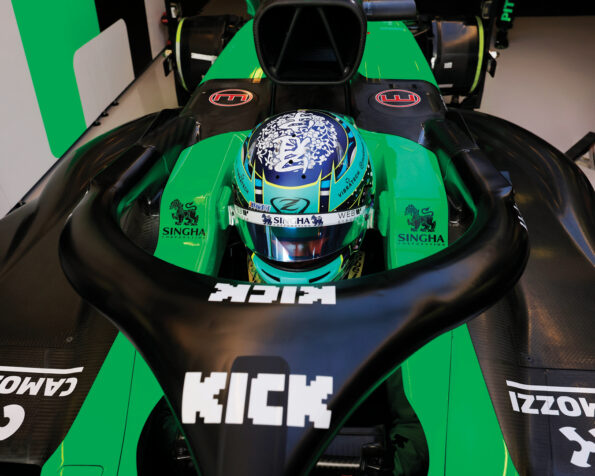
What do you remember from your time in the grandstands?
I remember exactly where I was sitting every year, being a similar spot. The first year I was actually very close to the entry of turn one, but most of the time I was in the main grandstand, because you can pretty much see turns one, two, three and turn five a little bit as well. I loved sitting there, just to be able to see the garage. When I was a kid I had binoculars and I could zoom into the garage, and it was really exciting to see what was going on behind the scenes and dreaming to be an F1 driver one day. So that’s what got me the dream to be in F1, watching the Grand Prix.
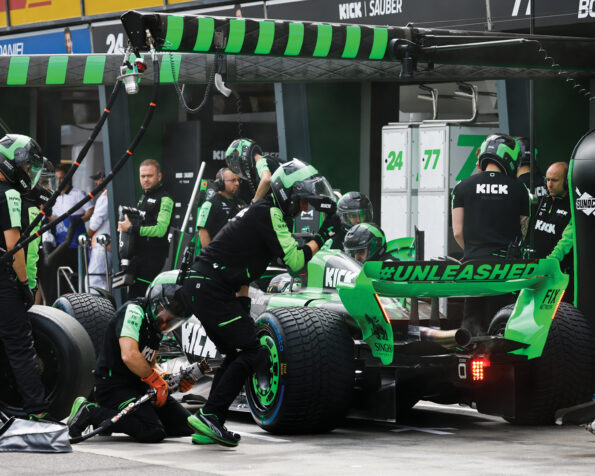
Last year we came close to China’s return, but the event was cancelled before the season due to COVID restrictions. How tough was that for you?
That was quite a tough moment because I was following what was happening. Because of the restrictions we still had in the country I knew it was not going to be easy, but there was still a 20 per cent chance it would happen. It became tricky when I learnt everyone would have to be in quarantine, at that point I knew it was not going to happen. I was a bit upset just because obviously I had been in F1 for two years already and I’m the only driver from China, the first driver, who would love to race at home, and it hadn’t happened. But I’m still glad to have made progress in my career, to still have a seat, and now we’re going home and making sure it’s a good one.
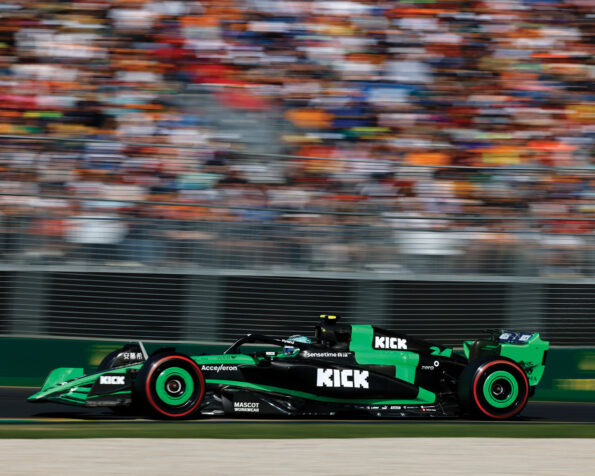
China has opened up to the world again, following the pandemic. How important are events like the Chinese Grand Prix?
It’s super important because, for example, when we had the Winter Olympics Games, skiing and snowboarding became a massive topic and stepped up as something people love to do as a hobby. And I think that is exactly what having the Grand Prix will do, having this massive event hosted at home in Shanghai. It’s a massive city and they can experience it for themselves at the Grand Prix, to feel the atmosphere and adrenaline in F1, which will build that interest in F1 and motorsport.
What’s it like when you go back to Shanghai, are you a megastar there?
Yeah, it’s always been quite tough to get around, but in general I think after the Grand Prix it’s going to be even worse for that. I’m happy as long as it means people understand who you are, and it builds the motorsport following for Formula One. So, it’s good for me. I have a lot of stuff planned for the Chinese Grand Prix to engage with the fans. Hopefully I can interact with the people who don’t really get to see me because the tickets sold out so quickly.
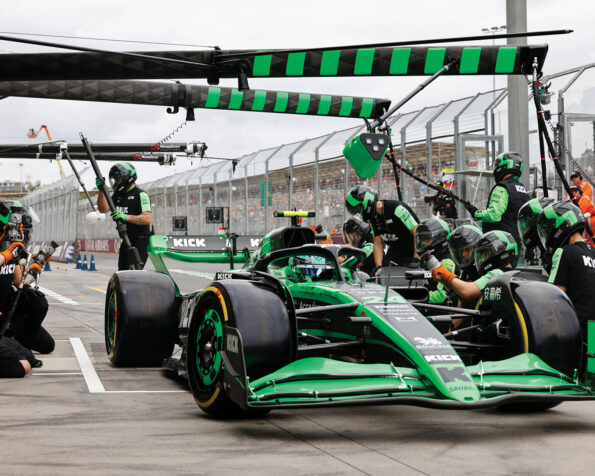
What’s the interest in China like for F1, and how important to China do you think it is to have a driver racing in an elite global series like F1?
The past few years or even past 10 years has been quite tricky. Obviously, it is a big event for everyone, China included, but people still don’t understand what motorsports or Formula One is, and what it means to be one of the 20 drivers on the grid. But, overall, I think I did quite a good job in terms of getting the contract in Formula One, then helping to express a little bit for the fans back home, to understand this, and for me I think now people know a lot more technical stuff about Formula One, compared to what it used to be. I think how quickly the tickets were sold out tells the story of how much interest people have for this event. It’s going to be very different to the last time there. It’s been five years since the last one, so I’m just really excited for that.
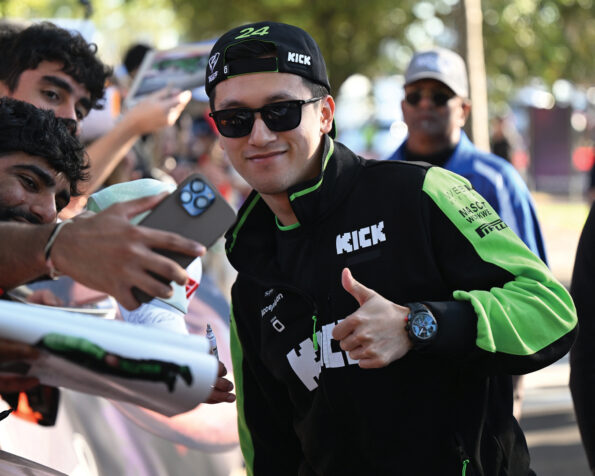
How are you feeling about your season so far?
I think the racecraft from my side has been improved a lot. If you take out the Jeddah [cross-threaded wheel nut] issue I had in the pit stop, I would have finished quite comfortably in P11 or P12, because [Haas’ Kevin] Magnussen did such a great job, and I had this gap. Obviously, Bahrain was P11, but no top five teams retired. It’s tough for us in the midfield, because the difference between top five teams – what they have in terms of performance in the car is such a big step compared to where we are. So, it’s difficult for us in normal circumstances to score points, but they can make mistakes, so we need to take every opportunity possible. Of course, the pit stops are something that we need to improve, and it’s about making actions so hopefully everything can be smoother.

You’re one of 13 drivers out of contract at season’s end. What are your plans for 2025? Another one-year deal with Sauber?
Obviously, it depends on the offers, you know – and what’s the long-term plan. I mean, as much as I’d love to be staying with Stake F1 Team [Sauber], I feel like a long-term contract is something I’m going to chase for my next contract. Having three years here as a rookie is a quite a nice thing to have, but from my third year, fourth year onwards, it’s right to say I’d like to have a longer contract, which can be a lot more settled down, together with development within the team and people at the factory. It’s important to have the same crew with me to be able to have that massive influence into the project going forward.
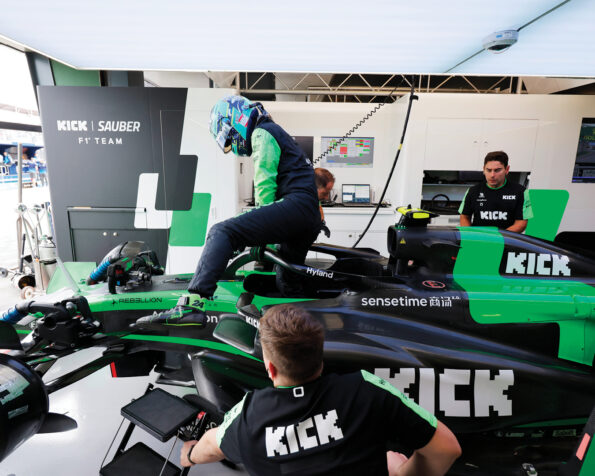
Tell us about your home life away from the track.
To be honest, there’s not much home life when you’re an F1 driver. I’m based in London, and I’ve always been there since I was young and moved abroad to race. I originally chose the UK as they have the highest category of karting for young drivers and then a lot of teams were based in the UK. So, I just settled myself there and I’m really happy to stay there because everything is very familiar, living in the UK with the people I know. Obviously, we travel a lot in and out of different countries each weekend. And the team’s factory is based in [Hinwil] Switzerland, so yeah, a lot of travel really.
What do you do when you’re not racing?
I’m training a lot, of course, but then I split a little bit because you can’t just train 24/7, really. There needs to be recovery time as well. I do go out with friends, love going to look at fashion and I’m designing some stuff myself. I love designing things in general, especially clothes.
By STEWART BELL
For the full article grab the May 2024 issue of MAXIM Australia from newsagents and convenience locations. Subscribe here.




